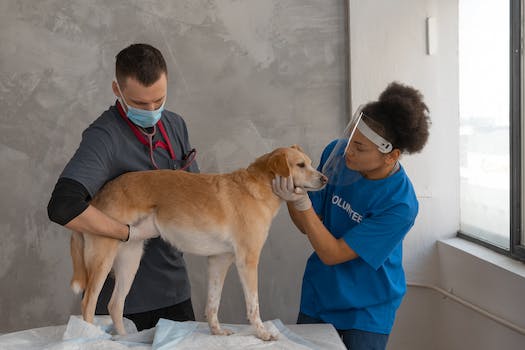

-
Table of Contents
Experience the Joy and Serenity: The Benefits of Animal Petting
Introduction
Animal petting, also known as animal-assisted therapy, has been recognized for its numerous benefits. This practice involves interacting with animals, such as dogs, cats, or even horses, in a controlled and supervised environment. The act of petting animals has been found to have positive effects on both physical and mental well-being. In this article, we will explore some of the benefits of animal petting and how it can enhance our overall quality of life.
The Psychological Benefits of Animal Petting
The act of petting animals has long been known to have a positive impact on our mental well-being. In fact, numerous studies have shown that interacting with animals can have a profound effect on our psychological health. From reducing stress and anxiety to improving mood and overall happiness, the benefits of animal petting are undeniable.
One of the primary psychological benefits of petting animals is its ability to reduce stress. When we pet animals, our bodies release oxytocin, a hormone that helps to lower stress levels. This hormone is often referred to as the "cuddle hormone" because it is released during moments of physical affection. By petting animals, we are able to experience the calming effects of oxytocin, which can help to alleviate feelings of stress and anxiety.
In addition to reducing stress, petting animals has also been shown to improve mood. When we interact with animals, our brains release endorphins, which are chemicals that promote feelings of happiness and well-being. These endorphins can help to lift our spirits and improve our overall mood. Whether it's stroking a cat's fur or playing fetch with a dog, the act of petting animals can bring us joy and contentment.
Furthermore, petting animals can also provide a sense of companionship and reduce feelings of loneliness. Many people find solace in the presence of animals, as they offer unconditional love and support. Pets can be a source of comfort during difficult times and can provide a sense of purpose and responsibility. The act of petting animals allows us to connect with them on a deeper level, fostering a sense of companionship and reducing feelings of isolation.
Moreover, petting animals can also help to improve our social skills and increase our sense of empathy. Interacting with animals requires us to be attentive and responsive to their needs, which can help to develop our ability to understand and empathize with others. This can be particularly beneficial for individuals who struggle with social interactions or have difficulty expressing their emotions. By petting animals, we can learn valuable lessons in compassion and empathy, which can then be applied to our relationships with other people.
Lastly, petting animals can also have a positive impact on our physical health. Studies have shown that interacting with animals can lower blood pressure and reduce the risk of heart disease. The act of petting animals has a calming effect on our bodies, which can help to regulate our heart rate and blood pressure. Additionally, the physical activity associated with pet ownership, such as walking a dog or playing with a cat, can contribute to improved cardiovascular health.
In conclusion, the psychological benefits of animal petting are numerous and significant. From reducing stress and improving mood to fostering companionship and empathy, interacting with animals can have a profound impact on our mental well-being. Whether it's cuddling with a furry friend or spending time at a petting zoo, the act of petting animals can bring us joy, comfort, and a sense of connection. So, the next time you have the opportunity to pet an animal, take advantage of it and reap the many psychological benefits it has to offer.
The Physical Health Benefits of Animal Petting

The act of petting animals has been shown to have numerous physical health benefits. Research has consistently demonstrated that interacting with animals, particularly through petting, can have a positive impact on our overall well-being. One of the main physical health benefits of animal petting is the reduction of stress and anxiety.
When we pet animals, our bodies release oxytocin, a hormone that is known to reduce stress levels. This hormone is often referred to as the "cuddle hormone" because it is released during moments of physical affection. Petting animals can trigger the release of oxytocin, leading to a decrease in stress and anxiety. This can be particularly beneficial for individuals who experience high levels of stress in their daily lives.
In addition to reducing stress, petting animals has also been shown to lower blood pressure. Studies have found that spending just a few minutes petting a dog or cat can lead to a decrease in blood pressure. This is believed to be due to the calming effect that petting animals has on our bodies. When we engage in this activity, our heart rate slows down, and our blood pressure decreases, promoting better cardiovascular health.
Furthermore, petting animals can also have a positive impact on our immune system. Research has shown that individuals who regularly interact with animals have stronger immune systems compared to those who do not. This is because petting animals exposes us to a variety of bacteria and allergens, which can help build up our immune system's tolerance. As a result, pet owners often experience fewer allergies and have a lower risk of developing autoimmune diseases.
Another physical health benefit of animal petting is the improvement of our mental well-being. Petting animals has been found to increase the production of serotonin and dopamine, neurotransmitters that are associated with feelings of happiness and pleasure. This can be particularly beneficial for individuals who suffer from depression or other mental health disorders. The simple act of petting an animal can provide a sense of comfort and companionship, helping to alleviate symptoms of these conditions.
Additionally, petting animals can also improve our physical fitness. Dogs, in particular, require regular exercise, such as walking or playing fetch. By owning a dog and engaging in these activities, individuals are more likely to meet their daily exercise requirements. This can lead to improved cardiovascular health, weight management, and overall physical fitness.
In conclusion, the physical health benefits of animal petting are numerous. From reducing stress and anxiety to lowering blood pressure and improving our immune system, interacting with animals through petting has a positive impact on our overall well-being. Furthermore, petting animals can also improve our mental well-being and physical fitness. Whether it's a dog, cat, or any other furry friend, taking the time to pet and interact with animals can have significant benefits for our physical health. So, the next time you see a friendly animal, don't hesitate to give them a gentle pet – your body will thank you.
The Social Benefits of Animal Petting
The act of petting animals has been shown to have numerous benefits, not only for the animals themselves but also for the people who engage in this activity. While many people may think of petting animals as simply a way to show affection, it actually has a profound impact on our social well-being. In this section, we will explore the social benefits of animal petting and how it can enhance our overall quality of life.
One of the primary social benefits of animal petting is the opportunity for increased social interaction. When we engage in petting animals, we often do so in a social setting, such as a petting zoo or a friend's house. This provides us with the chance to connect with others who share our love for animals. These shared experiences can lead to the formation of new friendships and the strengthening of existing ones. In addition, petting animals can serve as a conversation starter, allowing us to engage in meaningful and enjoyable conversations with others.
Furthermore, animal petting can also help to improve our social skills. When we interact with animals, we are required to be gentle, patient, and attentive. These qualities are not only important when it comes to interacting with animals but also when it comes to interacting with other people. By practicing these skills through animal petting, we can become more empathetic, understanding, and compassionate individuals. These qualities are highly valued in social interactions and can greatly enhance our ability to connect with others on a deeper level.
In addition to improving our social skills, animal petting can also help to reduce feelings of loneliness and isolation. Many people, especially those who live alone or are going through a difficult time, may experience feelings of loneliness and isolation. However, when we pet animals, we experience a sense of companionship and connection. Animals provide us with unconditional love and support, which can help to alleviate feelings of loneliness and improve our overall well-being.
Moreover, animal petting has been shown to have a positive impact on our mental health. Interacting with animals has been found to reduce stress, anxiety, and depression. When we pet animals, our bodies release oxytocin, a hormone that promotes feelings of happiness and relaxation. This can help to improve our mood and overall mental well-being. Additionally, petting animals can provide a sense of purpose and responsibility, which can be particularly beneficial for individuals who may be struggling with their mental health.
Lastly, animal petting can also serve as a form of therapy for individuals with certain social or emotional challenges. Animal-assisted therapy has been used to help individuals with autism, ADHD, and other developmental disorders. The presence of animals can help to calm and soothe individuals, making it easier for them to engage in social interactions and develop important social skills.
In conclusion, animal petting offers a wide range of social benefits. From increased social interaction and improved social skills to reduced feelings of loneliness and improved mental health, the act of petting animals has a profound impact on our social well-being. Whether it's through forming new friendships, practicing empathy and compassion, or finding comfort and support, animal petting can greatly enhance our overall quality of life. So, the next time you have the opportunity to pet an animal, take advantage of it and experience the many social benefits it has to offer.
Q&A
1. What are the benefits of animal petting?
Animal petting can provide emotional and psychological benefits, such as reducing stress and anxiety, promoting relaxation, and improving mood.
2. Are there any physical benefits to animal petting?
Yes, animal petting has been shown to lower blood pressure and heart rate, as well as boost the immune system and improve overall physical well-being.
3. Can animal petting help with social interactions?
Yes, petting animals can enhance social interactions by providing opportunities for bonding and connection, improving communication skills, and reducing feelings of loneliness or isolation.
Conclusion
In conclusion, petting animals has numerous benefits. It can reduce stress, lower blood pressure, improve mood, and promote social interaction. Additionally, petting animals can provide a sense of companionship and emotional support. Overall, engaging in animal petting can have positive effects on both physical and mental well-being.












